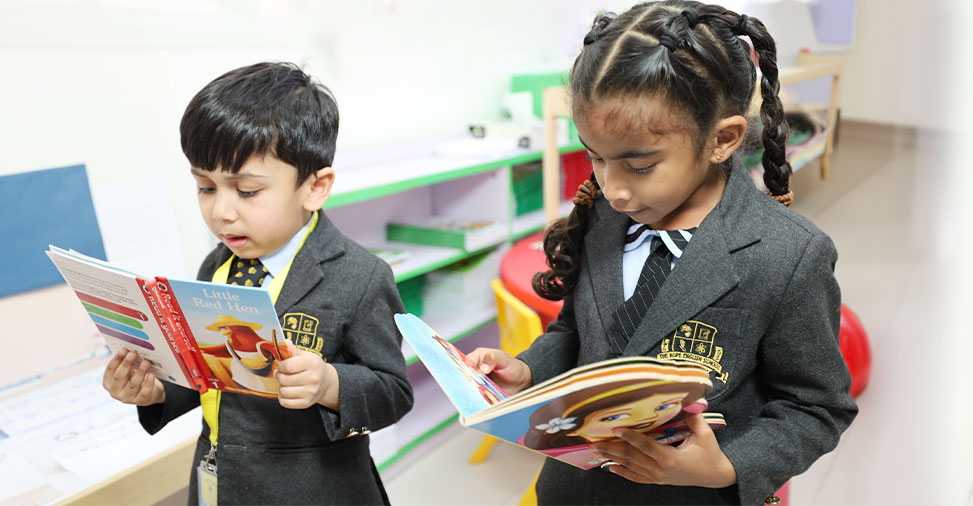





January 14, 2025
Reading and literacy development are fundamental aspects of a child’s education, and the British curriculum places significant emphasis on these areas from FS1 (Foundation Stage 1) to Year 6. As a parent, there's no greater joy than watching your child develop a love of reading and you play a crucial role in supporting your child's literacy journey.
Here are some practical tips for parents to help their children thrive in reading and literacy at British schools in Sharjah and British schools in Ajman.
1. Start Early with Foundation Stage (FS1 and FS2)
The foundation of reading and literacy begins early in the British curriculum. In FS1 and FS2, children are introduced to phonics, the building blocks of reading. Phonics helps children understand the relationship between sounds and letters, which is crucial for early literacy development. Many British curriculum schools in Sharjah and British schools in Ajman place a strong focus on this stage.
Tips for Parents:
Read Daily: Make reading a part of your child’s daily routine. Choose simple books with colorful pictures and repetitive phrases.
Phonics Games: Play phonics-based games to reinforce the sounds that letters make. Apps, flashcards, and books that emphasize rhyming words are great tools.
Talk About the Pictures: Encourage your child to look at the pictures in the book and make up stories based on them. This will help develop their vocabulary and storytelling skills.
2. Encourage Regular Reading Habits in Key Stage 1 (Year 1 and Year 2)
As children move into Key Stage 1 (Years 1 & 2), they begin to build on their phonics knowledge, learning to blend sounds into words and improving their comprehension skills. In best British schools in Sharjah and Ajman, this stage is marked by structured reading activities and support.
Tips for Parents:
Read Together: Encourage your child to read aloud to you. Take turns reading and ask questions to check their understanding.
Sight Words: Introduce high-frequency words (sight words) that don’t follow regular phonics rules. These words are often found in everyday reading.
Reading Aloud: Reading stories aloud with expression helps your child understand tone, rhythm, and the structure of language. This practice also builds fluency.
3. Support Reading Fluency in Key Stage 2 (Year 3 to Year 6)
In Key Stage 2, students start reading more complex texts. They are expected to develop skills in comprehension, inference, and analysis. The British curriculum schools in Sharjah encourage students to engage with a wide variety of texts, from fiction and non-fiction to poetry and plays.
Tips for Parents:
Challenge with Different Texts: Encourage your child to read a variety of genres and types of books to broaden their understanding and enjoyment.
Comprehension Questions: Ask open-ended questions to help your child understand the material deeply. For example, "What do you think the character is feeling?" or "Why do you think the author wrote this?"
Use Audiobooks: Listening to audiobooks can help improve fluency, vocabulary, and comprehension. This can also be an excellent way for your child to experience new stories if they struggle with reading.
4. Incorporate Reading into Everyday Life
In addition to formal reading sessions, it’s essential to integrate reading into everyday activities. This helps children see reading as a fun and useful skill, especially in British schools in Sharjah and British schools in Muweilah Sharjah.
Tips for Parents:
Signs and Labels: Label items around the house with their names and encourage your child to read them aloud. This turns everyday tasks into reading opportunities.
Reading for Purpose: Let your child read recipes, instructions, or maps. This shows them that reading has practical uses in daily life.
5. Create a Positive Reading Environment
Creating a nurturing reading environment at home is vital for cultivating a lifelong love of books. Many affordable British schools in Sharjah and Ajman also offer strategies and resources to encourage reading.
Tips for Parents:
Access to Books: Ensure your child has easy access to books that are appropriate for their age and interests. Consider joining a local library or swapping books with friends and family.
Read Before Bed: Make bedtime stories a regular habit. This creates a calm, enjoyable routine that reinforces the importance of reading.
Be a Reading Role Model: Show your child that reading is enjoyable by modelling the behaviour yourself. Share the books or articles you are reading and talk about them with enthusiasm.
6. Foster Writing Skills Alongside Reading
Reading and writing are interconnected. Encouraging your child to write will enhance their literacy skills and boost their confidence as readers.
Tips for Parents:
Journaling: Encourage your child to keep a journal or diary where they can express their thoughts. This strengthens writing skills and provides a space for creative expression.
Creative Writing: Provide prompts for creative writing, such as "Write a story about a magical adventure" or "Describe your dream vacation."
Spelling and Grammar: Practice spelling and grammar by playing educational games, using apps, or correcting mistakes together in a positive, supportive manner.
Reading and literacy are key components of a child’s overall development, and the British curriculum provides a solid foundation in these areas from FS1 to Year 6. As parents, you can play an active role in supporting your child’s literacy journey by encouraging reading at home, discussing texts together, and creating a positive reading environment. By following these tips, your child can develop strong reading and writing skills that will serve them throughout their education and beyond. Emphasis on literacy will ensure your child’s well-rounded education, nurturing both academic skills and a love for learning.